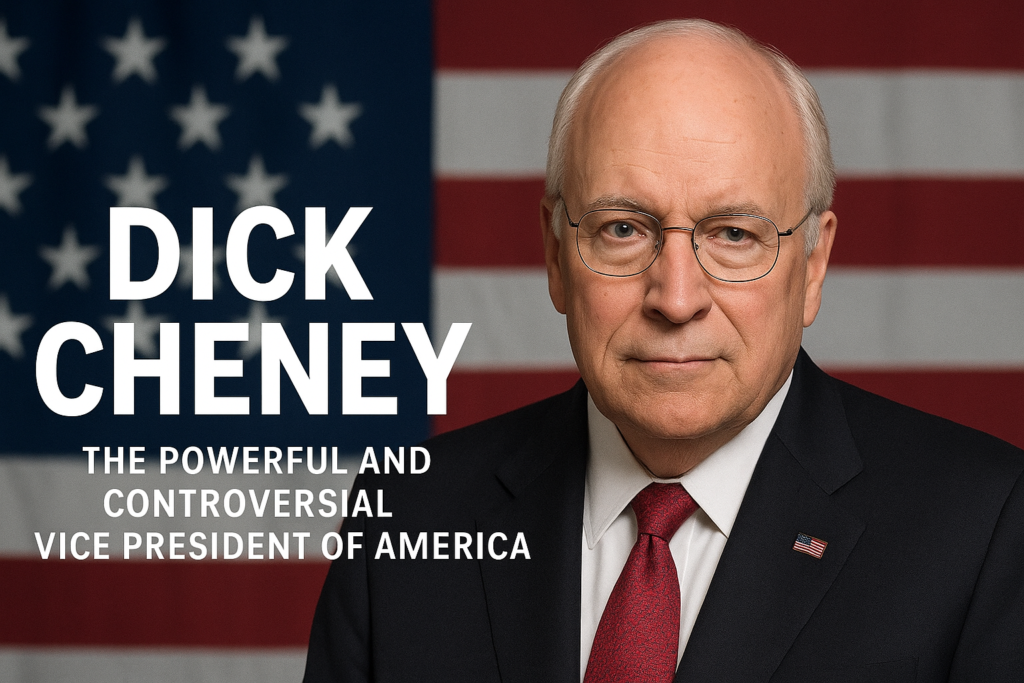
Dick Cheney, the 46th Vice President of the United States, remains one of the most influential and controversial political figures in modern American history. Serving under President George W. Bush from 2001 to 2009, Cheney’s policies and decisions shaped U.S. defense, foreign relations, and national security during one of the most turbulent times in the 21st century
Early Life and Education
Richard Bruce Cheney was born on January 30, 1941, in Lincoln, Nebraska. Raised in Casper, Wyoming, he developed an early interest in politics. After attending Yale University, Cheney completed both his Bachelor’s and Master’s degrees in Political Science at the University of Wyoming. His academic background laid the foundation for a career that would span decades in government and business

Rise in American Politics
Cheney’s political journey began during the Nixon administration, where he worked as a congressional intern. His intelligence and work ethic quickly earned him prominent roles, leading to his appointment as White House Chief of Staff under President Gerald Ford (1975–1977).
In 1978, Cheney was elected to the U.S. House of Representatives from Wyoming, serving for six terms. As a congressman, he gained a reputation as a conservative leader and expert on defense issues.
Defense under George H.W. Bush
In 1989, Cheney became the U.S. Secretary of Defense under President George H.W. Bush. During his tenure, he oversaw Operation Desert Storm, the U.S.-led military response to Iraq’s invasion of Kuwait. The swift success of this mission elevated Cheney’s standing as a strong and decisive defense leader.
Vice Presidency (2001–2009)
When George W. Bush selected Cheney as his running mate in the 2000 presidential election, few could have predicted the depth of his influence. Following the September 11, 2001 terrorist attacks, Cheney became a key architect of America’s “War on Terror.
He strongly advocated for:
The invasion of Afghanistan (2001) to dismantle al-QaedaThe Iraq War (2003), arguing that Saddam Hussein possessed weapons of mass destructionExpanded surveillance programs and enhanced interrogation techniques, which sparked major ethical and legal debates.
DIGI MERCH STORE PRINT ON DEMAND

Business and Private Life
Between his government roles, Cheney worked in the private sector as the CEO of Halliburton, a global energy services company. This connection later drew scrutiny when Halliburton received major government contracts during the Iraq War.Despite the criticism, Cheney remained unapologetic about his decisions, often emphasizing that his actions protected American lives
Legacy and Controversy
Dick Cheney’s legacy is one of power, strategy, and controversy. Supporters view him as a strong leader who safeguarded America during its most vulnerable years. Critics, however, accuse him of promoting unnecessary wars and undermining human rights.Regardless of perspective, few deny that Cheney reshaped the role of the vice president, wielding more influence than any of his predecessors
Conclusion
Dick Cheney’s story is a complex blend of patriotism, power, and political calculation. His policies continue to influence American defense and foreign relations even years after leaving office. Whether seen as a protector or a polarizing strategist, Cheney’s imprint on U.S. history is undeniable — a legacy both respected and debated worldwide.
GeorgeW.Bush. InfographicsPresentation
CheneyBiography. PinterestpinsFlyers
U.S.DefensePolicy. socialmediaposts
VicePresidentofAmerica. Affiliatemarketing
Comment















